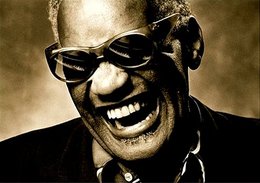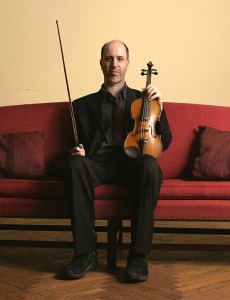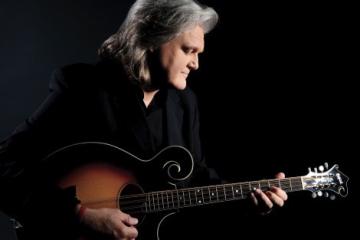Jazz Review: Ray Charles Inspires One Hell of a Party at Berklee
Ray Charles had one of the great voices of the twentieth century, and even the best singers have very large shoes to fill when paying tribute.
By Steve Mossberg
InspiRAYtion: The Music of Ray Charles was the capstone concert of a weekend-long symposium (September 21–23) on the pianist’s work and legacy held by the American Roots Music Program at the Berklee College of music. The mixture of Charles’s devotees, colleagues, personal friends, and a striking number of blind musicians and members of the blind community that packed the sold out Berklee performance were treated to two hours and 15 minutes of sublime musical tribute—no intermission, no holding back, and no letting up.
The man behind the project was Matt Glaser, head of the Roots Music Program, and long time chair of Berklee’s string department. In addition to being a first-rate violinist in roots and jazz traditions, Glaser is an authority on the instrument’s role in American music and a dynamic and eloquent clinician with a wicked sense of humor. Playing on the symposium’s thesis that “all the great steams of American music flow through Ray Charles,” he sought to represent each one on the stage. The scope of the evening was impressive: Glaser booked a huge, faculty big band, seven lead vocalists, including world-renowned, blind singer-songwriter Raul Midon and alternative rocker Tracy Bonham, a string quartet, the current quartet of legendary jazz guitarist John Scofield, bluegrass legend Ricky Skaggs, the very-talented jazz/Americana songwriter Doug Wamble, and a homegrown trio of Berklee Raeletts.
Ray Charles had one of the great voices of the twentieth century, and even the best singers have very large shoes to fill when paying tribute. The challenge, of course, is to tip one’s artistic hat without impersonating him. Tracy Bonham surprised with a breezy and soulful alto on “Ain’t That Love.” Despite some Billie Holiday affectations that are so common among young vocalists, 23-year-old Margaret Glaspy performed a highly mature and emotional rendition of “The Brightest Smile.” Raul Midon was sublime and fiercely original in his take on “Don’t Let the Sun Catch You Crying” and “I’ve Got News For You.” Dennis Montgomery brought a heavy dose of gospel to Charles’s material, also playing some truly excellent Hammond organ on “Georgia on My Mind.” After a touching story about the first time he met the master himself, Ricky Skaggs sang “You Win Again” like a pure old-time country ballad.
When Doug Wamble led Glaser’s own Wayfaring Strangers through a rousing “I Got a Woman,” it appeared as if he was going to steal the show, but the best was yet to come, in the form of Donna McElroy. McElroy, a Grammy-nominated singer, voice professor, and vocal coach for the evening, had earlier wowed the audience when she belted out “You’re In For a Big Surprise” with the big band. When she performed “America the Beautiful,” assisted by abstract accompaniment from faculty piano whiz Jetro da Silva, she displayed flawless vocal technique while navigating the serpentine chord changes. McElroy created a brilliantly massive sound, artfully pulling off scintillating gospel runs from tenor depths to the highest wails. The audience was up in a standing ovation before she even finished the last note.
With any large-scale musical project of such ambition, there are bound to be missteps, particularly when it’s a one night only affair. Despite the generally spot-on execution of difficult big band arrangements, one could occasionally hear a stray drum hit or a false start from an accompanist. There was a moment of miscommunication between guitarist and bass player on an instrumental number and several brief trip-ups when soloists entered and exited. Scofield, in particular, who was in top form and enjoying it, seemed to catch his comrades off guard with the length and frequency of his improvisations. These mistakes, however, were minimal in a strictly musical sense, and even more so when heard amid the great excitement and positive energy of the evening.
The great pleasure of the concert was to see and hear the musician’s admiration for both Charles’s music and each other. When the local piano hero Laszlo Gardony played an excellent, classical inflected solo on “I Love You, I Love You,” Ricky Skaggs snuck over behind him to watch his technique and whisper words of encouragement. Doug Wamble peeked his head between Bill Stewart’s cymbals to watch Scofield’s hand on the fretboard. The string quartet was all smiles at Stewart’s percussive flourishes. Skaggs’s fleet mandolin playing clearly wowed the saxophone section of the big band. When Marcus Belgrave, Charles’s original trumpet player came out, aged and frail with an oxygen tank, and proceeded to solo for three minutes like a young lion, legendary percussionist Jamey Haddad closed his eyes and bopped his head along ecstatically.
Borders were crossed, and bonds quickly formed. Soul singer Larry Watson and Tracy Bonham ballroom danced across the stage together through “You Are My Sunshine.” Scofield, who originally seemed taken aback when Skaggs ribbed him about an “excessive” solo (“in a good way, John”) was belting out country backup vocals with him by the time the band got to “I Got a Woman.” Skaggs, who joked bashfully about not being able to play mandolin on the jazz tunes, ended up dishing out masterful blues licks on the finale “Let The Good Times Roll.” Glaser himself was super-charged with energy all night, popping in and out between the ensembles, conducting every single musician on stage and exclaiming, after a particularly countrified soul number, “this is American music!”
It was American music at its finest. Glaser’s expansive ideas and risks paid off big time. By exploring Charles’s own beliefs that musicians can seamlessly cross between the church and the secular, country and soul, and rock and jazz, he served up an evening of musical inspiration that transcended petty labels and limits—and threw one hell of a party.




thanks for the awesome review—-!fyi—Julius Williams was the conductor…not me……
matt glaser
I’m well aware that Julius Williams was the conductor of the big band, and an excellent one at that. My intention with the sentence on Glaser was to illustrate that he indeed did pop up all over stage throughout the night, throwing enthusiastic cues to everyone from the backup singers to the guitarists to the horn section. I had no intention of slighting Mr. Williams in any way.
I was honored to receive an invitation to attend the weekend symposium and concert. Mr. Matt Glaser and all performers did a fantastic job paying tribute to the man and His music. One correction! it’s Raelettes not Raeletts. As a former Raelette (1994-1996; 2000-2003), I thought the Berklee Raelettes added a nice touch to a stellar evening of music.
It has been about 50 years since I laid foot in this building. You see, my father was the owner of “Alford’s Fenway Bowling Alley’s”. And believe me that old building never sounded like it did on Saturday night.
Donna McElroy told me about the concert and loving Ray Charles music as I do I went with my husband and friends.
It was amazing…everyone was having a grand time on stage as was the audience with all the head bobbing and shoulders moving. The mc was unbelievable…he wanted to be everywhere…what a group!
Donna’s voice … beautiful and “America” Oh my gosh just telling people about this gave me shivers.
The singers, musicians all fabulous. Can’t wait to go to another concert at my Dad’s bowling alley.
Thank you for a fantastic 2 hours and 15 minutes that lasted in my mind even longer.
Sincerely, Sandy Rollo
I’m well aware that Julius Williams was the conductor of the big band, and an excellent one at that. My intention with the sentence on Glaser was to illustrate that he indeed did pop up all over stage throughout the night, throwing enthusiastic cues to everyone from the backup singers to the guitarists to the horn section. I had no intention of slighting Mr. Williams in any way.